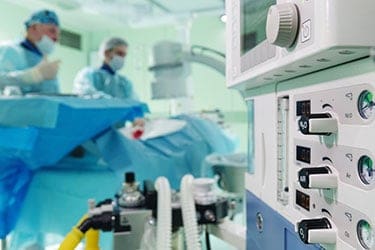
Thousands of people in Pennsylvania and millions across the United States utilize some type of medical device to improve and potentially save their lives.
However, with breakthroughs and innovations in medical devices also comes the potential for complications and other issues once the device is implanted.
While some medical devices have a history of successful use in patients, others have proven to be hazardous and unreliable, often causing more pain than good.
Our team of medical device lawyers at PhillyLaw are here to help you collect the compensation you deserve from companies that manufacture defective medical devices and harm you in the process.
How Do Defective Medical Devices Get Into the Marketplace?
The federal Food and Drug Administration (FDA) vets, approves and monitors the use of medical devices in the United States.
However, with the sheer number of medical devices on the market today, some defective devices slip through the cracks. In addition, some manufacturers of medical devices deliberately mislead the FDA and other agencies as to the effectiveness of their devices.
They may cut down the amount of testing or bypass it altogether in order to get their latest product on the market or lie about the results that do come from product testing the medical device.
Regardless of the reason, if a medical device manufacturer releases a faulty device into the market, they can be held liable for the damages caused by their device. If you believe that you have been injured as a result of a defective medical device, you may have a claim for compensation for that harm that has been caused.
Defective Medical Devices
There are a number of medical devices currently being recalled by the FDA for being defective or harmful in some way. If you or a loved one has used any of the following medical devices you should contact a defective medical device attorney right away.
Allograft Recalls
Allografts are human tissue transplants, and some companies have defied safety regulations in their acquisition, handling, and screening of human tissue for surgery.
Cryolife and Biomedical Tissue Services are both facing lawsuits after patients who received allografts from their companies were subsequently infected with HIV/AIDS, hepatitis, syphilis, bacterial and fungal infections, and other harmful diseases.
Allografts include bone, skin, tendon, ligament, cartilage, and other connective tissues that are commonly used in knee surgery, reconstructive plastic surgery, vein grafting, back and spine surgery, and gum surgery.
Bair Hugger Warming Blankets
The Bair Hugger warming blankets have been tied to multiple instances of deep joint infections after use in surgery for knee or hip replacements. The Bair Hugger blankets are used to keep patients warm during surgery by pumping heated air through chambers in the blanket; however, the expulsion of air from the blanket is known to stir up germs and contaminants in the operating room, then sucking them back into the blanket and expelling them onto the patient surgery.
These germs lead to deep joint infections, such as MRSA.
Bausch & Lomb ReNu with MoistureLoc Contact Lens Solution
While most people only consider implanted devices as medical devices, other products that aid medical devices can also be defective.
Bausch & Lomb recalled this contact lens solution after multiple reports of Fusarium keratitis infections linked to its use. Multiple consumers of this product required corneal transplants after severe scarring from the infection.
Hip Implants
Hip implants are one of the most common medical devices in the United States and used to relieve hip pain as well as increase mobility in patients.
There have been many hip implants recalls and lawsuits for defective devices in recent years. Sulzer Orthopedic recalled their device after it was discovered that a residue on their device caused bond failure with the patients’ bones.
Metal on metal implants like the ones made by DePuy and Stryker have caused catastrophic failures in patients. Porous hip implant devices like the Zimmer Durom Cup have also been subjected to lawsuits after patients reported implant failure, migration, and lack of proper fusion with the bone.
IVC Filters
An IVC filter is placed in the inferior vena cava vein for the purposes of preventing pulmonary embolisms from entering the heart after forming in the lungs.
However, IVC filters have been shown to cause other deadly conditions, including deep vein thrombosis in patients with the filters. Dozens of patients have died as a result of complications caused by IVC filters manufactured by C.R. Bard and Cook Medical.
Other accusations against the companies include hundreds of patient injuries, ignored warnings about the products’ dangers, potentially fraudulent FDA approval, and breach of warranties with the product.
Knee Replacements
Knee replacement surgery is the most common replacement surgery in the United States with 200,000 to 300,000 surgeries taking place every year. However, a number of companies with knee replacement devices, including DePuy, Johnson & Johnson, Encore, Stryker, Howmedica, and Smith & Nephew have been recalled for failing to properly bond with a patient’s bone.
The complications from these defective medical devices have included severe pain, infection, joint, and muscle damage decreased mobility and range of motion, and need for future surgeries.
Paragard
This device is an intrauterine device (IUD) used for birth control in women. This is a copper-based IUD that can stay implanted for up to ten years but has been shown to migrate and cause complications upon removal.
There have been instances of the IUD migrating throughout the uterus and into other parts of the body. This can lead to vaginal bleeding and decreased the reliability of the device as effective birth control, leading to multiple issues of a problematic pregnancy. In cases where the device migrated too far, surgery is required to remove it.
Pelvic Mesh
Pelvic mesh has been used for a number of different procedures in the last few decades, including use as transvaginal mesh, bladder slings, and bladder mesh.
It is used to prevent pelvic organ prolapse and urinary incontinence in women but also causes a number of serious complications, including infection, internal bleeding, organ erosion, and organ perforation.
Call Our Office to Speak with a Medical Device Lawyer
Medical devices can seem safe upon first look, however, they can also present a harmful outcome. The attorney at PhillyLaw has your back and can offer you one on one representation if you think you have a case.
If you or someone you know has been injured because of a defective medical device in the Philadelphia area, our office is here to help. Call or contact PhillyLaw today to speak with an experienced defective medical device attorney for free about your potential defective medical device claim.

